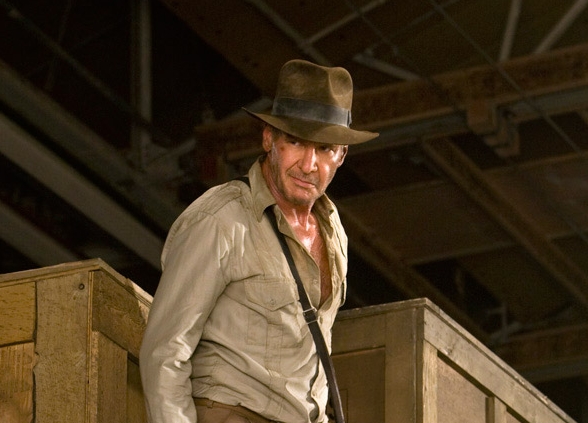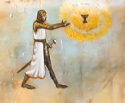Articles

Indiana Jones Reviewed Last Crusade

A faintly religious (and perhaps faintly ridiculous) article by "Gabez."
I was seven years old, and I had a video. I didn't know where it had come from or what it was really called; it was merely "the video." I put it into the telly machine and it showed talking pictures. "What have you got on that video?" my friends asked. "Everything," I replied.
The video was of course, as I know now, Indiana Jones and the Last Crusade. It was the first film I can remember watching, and having it put me in a position of weird power over my friends. I didn't realise that there were other Indiana Jones films, and it didn't really matter. Why would I need other Indiana Jones films – or any other films – when I had The Last Crusade?


I had to wait for the Grail in order to get the imaginative thrill that I sought then, and still seek now.

The film plays like a giant tick-list of everything that is awesome. Seven-year old me, feet not reaching to the ground on my chair, sticky marmite sandwich in my hand, large glassy eyes, watches the film in amazement. Indy stands before us. He is a young person like me (I fidget excitedly), and already he has stolen somebody's golden treasure. He runs, he leaps, he horse-rides and he makes smart remarks. The John Williams strings pick up and Indy jumps onto a train. All of my favourite animals are there and Indy's there as well. He whips a lion in the face!
Then something quite amazing happens, and my marmite sandwich drops forgotten to the floor. "May this who illuminated this, illuminate me": the Grail is introduced. This, together with Indiana's father, elevates the film from being mere action to something else: something bigger than the hero, bigger than the film. Lions and bandits and trains are all impressive enough, but the effect is doubled when they are matched with a quote from Charlemagne and a glimpse of medieval manuscript; the effect is then tripled by the present of Christ. Is it an exaggeration to say that the Grail was my first taste of "real" religion? It probably is, and yet what affects me about the Grail is something very similar to what affects me, occasionally, in church.
One must be penitent before the Lord, not because He is a friend who plays baseball with us (like on those ghastly porcelain trinkets), but because He is beyond all of us. It is a mysterious relationship, but one that Henry Jones, at least, seems to understand. When his son blasphemes he gets a slap, not because of bad manners, but because there he has shown ignorance of He who is always in us and outside of us. Henry Jones then frames the film in the following way: "This is not archaeology. It is a race against Evil. If the Nazis get the Grail then the armies of darkness will cover the world."
Now here I reach a difficulty: how is this so very different from the effect of the Ark? In Raiders, as well, we had a sense of the outside and the eternal; we had this also, to an extent, in Temple of Doom. I can only say that Last Crusade makes this point more boldly and more continuously. Indiana Jones is constantly against events bigger than himself, from the lion, to the Crusader Knight, to Christ. If I had a criticism I might say that the Grail itself is lost against this. Perceive the way that Charles Williams represents the Grail in War in Heaven:
""Neither is this Thou," he breathed; and answered, "Yet this also is Thou." He considered, in this, the chalice offered at every alter, and was aware again of a general movement of all things towards a narrow channel. Of all material things still discoverable in the world the Graal had been the nearest to the Divine and Universal Heart. Sky and sea and land were moving, not towards the vessel, but towards all it symbolised and had held."
Perhaps this would have been too much for the film to cope with. What we do get in the film is a strong hint of Mystery, of Christ, of the Other, of large and incomprehensible events set against Dr Jones. Making a film like this is, I imagine, a large-scale balancing act. Push the religion too far and the thrill passes away; leave religion out of the plot and the thrill (to me) becomes meaningless.


The reaching hand is clasped and an understanding is achieved.

Indiana Jones is probably an agnostic. He is a man of educated doubts. In Raiders of the Lost Ark, he claims to not believe in any "superstitious hocus-pocus," a statement that may well be doubted after considering Temple of Doom. Certainly he has seen a lot of strange phenomena and does not feel a need to put one explanation on it. What's more interesting than Jone's possible religious doubts, though, is the doubts he has over his own father.
When Henry Jones defeats the aeroplane with his umbrella, Jone's face is set in admiration. When Henry Jones at last calls his son by his preferred name, it has a profound result. The reaching hand is clasped and an understanding is achieved. The film might not present a religious progression, but it does at least show the journey of a father/son relationship, which is arguably a better plot (or so the atheists might say). Certainly I respond to it far better than the love plots in Raiders or Temple – it delights me that the romantic plot in Crusade is dissipated, and replaced with a different kind of love plot, one that I, personally speaking, am more interested and moved by.
It was a plot that affected me most as a child, as well. I regarded the sex scene in Venice with amusement and a little embarrassment. "I hate arrogant men" was a funny line. Funny, yes, and quite good for what it was, but not actually what I was after. I had to wait for the Grail and for the father and son plot (itself a microcosm of the Grail) in order to get the imaginative thrill that I sought then, and still seek now. Certain scenes and phrases – "the penitent man will pass"; the appearance of the Knight, &c. – gave, and still give, glimpses into the magical, mysterious land of the East and of romanticised history. It is all pointing to something else. "Neither is this Thou... yet this also is Thou."
It's not only my favourite Indiana Jones film, but also, possibly, my favourite film ever. It is not perfect; it does not need to be. What it does, like any good piece of art, is lead the viewer by the imagination, moving into new perspectives and landscapes. After watching the film with my friend, I, seven years and eight months old, marmite smeared on my cheek, hair exploding from my scalp, jumped off the sofa and with my trusty companion, explored my own house as if for the first time. I remember a piece of cloth we used to have with the phrase "Lord bless this home" on it. I had read it a hundred times before. I picked it up and turned it around so that I could only see the reversed stitching of the writing. "It's a secret code," I proudly informed by friend, who nodded gravely in response. "We have to work it out before the Nutsies get to us. Follow me: I know the way!"

Second Opinion by Chris C.
I'm sorry for bashing the Tank Battle, okay? It's freakin' awesome. Even though I may consider Raiders the best Indy film, like I consider Empire Strikes Back the best Star Wars film, I still prefer to sit down with the final part of each trilogy. It's just the most fun out of the lot, and the Sean Connery/Harrison Ford dynamic is just pure gold.
And I still love that Grail music!
Coming soon... Kingdom of the Crystal Skull!
